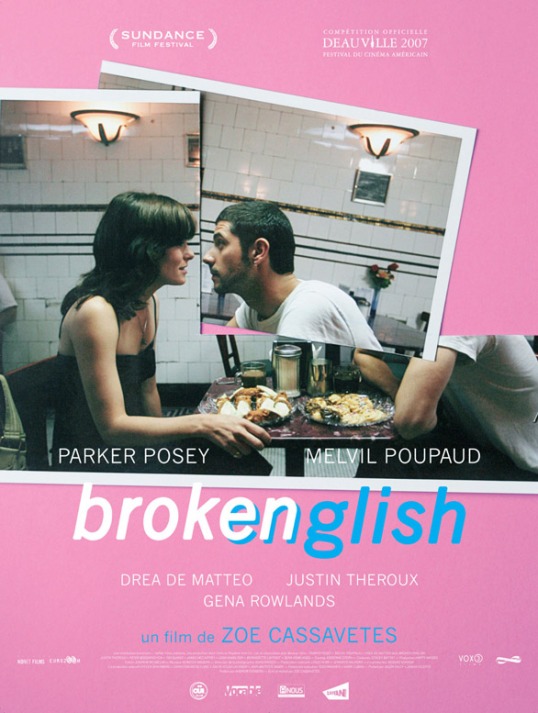Nora Wilder is freaking out. Everyone around her is in a relationship, is married, or has children. Nora is in her thirties, alone with job she’s outgrown and a mother who constantly reminds her of it all. Not to mention her best friend Audrey’s “perfect marriage”. But after a series of disastrous dates, Nora unexpectedly meets Julien, a quirky Frenchman who opens her eyes to a lot more than love. (Imdb)
July 19, 2007
First shot, a closeup: Parker Posey. Next shots, mostly closeups. She smokes, she regards her face in the mirror, she does her hair and gets ready to go to work. She captures perfectly that way women have of arming themselves against the merciless scrutiny of the world. Does any woman, looking in the mirror, think of herself as beautiful?
What Posey brings to this sequence is something I’ve often felt while watching her movies, even the incomprehensible ones like “Fay Grim.” She stands poised between serene beauty and throwing a shampoo bottle at the mirror. She always looks great, and she always seems dubious and insecure. She can make half her mouth curl into a reluctant smile. But when she fully smiles, she’s radiant. She is well cast for “Broken English,” because her character, Nora Wilder, needs precisely that in-between quality.
In some seasons, she falls instantly in love. In others, she sinks into depression. The perfect man comes along and hurts her cruelly. The movie, written and directed by Zoe Cassavetes(daughter of director John Cassavetes and actress Gena Rowlands), is about a woman with a knack for trusting untrustworthy men. She dates an actor (Justin Theroux) and a nice normal guy (Josh Hamilton), and both times confides to her closest friend Audrey (Drea de Matteo) that this guy might be the one, and both times she is crushingly wrong.
Then at a party she meets Julien (Melvil Poupaud), a French guy who seems too good to be true. Maybe that’s where the story breaks down, if only because he is too good to be true. It’s like he went to a feminist training academy, to learn how to treat a woman with gentleness, warmth and perfect sexual tact. He has to return to Paris. Quel dommage. She says she will join him there.
Meanwhile, there are subplots. Audrey is unhappy after five years of marriage. Nora’s mother (Rowlands) has wise but worried advice (most women “at your age,” she tells Nora, have been snapped up). Nora, who works as the VIP concierge in a Manhattan boutique hotel, works all day to make others happy, and then drinks and smokes and mourns about her life to Audrey. Is Julien the answer? After all, she doesn’t even speak French (unlikely, as the VIP concierge in a boutique hotel, but there you have it).
The question clearly becomes, will she go to Paris and find Julien? If the answer is no, that’s a rotten way to treat your audience. If it’s yes, your movie is over. So I’m not giving away anything if I point out that, from the point of view of plot dynamics, she must first fail to find Julien and then succeed. As I’ve pointed out before, some movies give themselves away.
OK. She’s in Paris. All she has to do is call Julien. How could there be a problem? Read no further if you can’t guess (pause) that she loses his number. And that after moping about Paris and meeting an extraordinary number of nice guys, she has a Meet Cute with Julien, but he is sullen and angry because she is on her way to the airport and has been in Paris and did not even call him. Obviously, it’s a perfect Idiot Plot setup, because one word would solve everything. But he glowers between Metro stops, and when he finally discloses what bothers him, she says, “It’s really complicated.” Which it is not. All together now, as we telepathically chant the four words she needs to say.
So what happens is, “Broken English” establishes a sympathetic character, gets Parker Posey to make her real, and then grinds her in the gears of a plot we cannot believe. Surely these people are complex enough to have their futures settled by more than a Meet Cute and an Idiot Plot that can only hold out for two minutes? When the credits roll, we ask, with Peggy Lee, “Is that all there is?” There is a very good movie named “Before Sunset” that begins more or less where this one ends. Which tells you something right there.
http://www.rogerebert.com/reviews/broken-english-2007
BY JASON CLARK ON JUNE 16, 2007
Parker Posey may be known foremost as Queen of the Indies, but Queen of the Gaze would be a more appropriate title. As I said in my review of Fay Grim a few months back, Posey is one of the industry’s most misused great actresses, but it seems like filmmakers are finally picking up the slack. Zoe Cassavetes’s Broken English is really just a Whit Stillman-like rendering of an episode of Sex and the City (imagine if Carrie Bradshaw and the gang went to Film Forum instead of Cafeteria), but every time it lets Posey take center stage with her inimitable range of expression (which in this case, is more often for dramatic effect), you’re convinced you’re watching something more than a chick flick without KT Tunstall tunes.
The actress plays Nora, an eternally single hotel manager in New York City who is prone to corralling bad dates, dodging her well-meaning but meddlesome mother (Gena Rowlands, wasted here like much of the terrific supporting cast), and punishing anxiety attacks. After a string of dates that go nowhere, she decides to attend a nerdy coworker’s house party, where she meets the hunky, French, straw-hatted Julien (Time to Leave‘s wonderful Melvil Poupaud). Before long, Nora and Julien start devoting all their time to each other, but only for a weekend, and in their tumultuous, yet fervently romantic time together, they begin to wonder where to take their relationship. Then the film becomes a travelogue of sorts, leading Nora on a journey of self-discovery, with best pal Audrey (Drea de Matteo) in tow.
Basically, Broken English is a hipster’s pastiche of every chick flick you’ve ever seen except with expert breeding, but it doesn’t completely erase the feeling of déjà vu. This film is most successful in its throwaway moments (Nora’s stalling after being asked out by Justin Theroux’s obnoxious actor; an impromptu afternoon wine session with a group of artsy French guys), and when it explores Nora’s self-absorptive qualities, the film wisely doesn’t let her off the hook just because she’s cute. But when the picture finally resolves with the exact same ending as Richard Linklater’s Before Sunset (and I mean exactly—with even the same two last lines, for God’s sake), you have to wonder if Ms. Cassavetes gets out as much as her lead character eventually does.
http://www.slantmagazine.com/film/review/broken-english
By MATT ZOLLER SEITZ
June 22, 2007
The low-key comedy “Broken English,” about a romance-scarred professional woman named Nora Wilder (Parker Posey ) who invigorates her life with help from a handsome, sensitive, fedora-clad Frenchman (Melvil Poupaud), is a textbook example of an Indiewood film: a Hollywood fantasy wrapped in plain brown paper.
Its contradictory message is something like: “Listen up, 30-something single women; there is no Prince Charming. Oh, wait a minute … Yes, there is!”
Written and directed by the first-time feature filmmaker Zoe Cassavetes , daughter of the pioneering independent director John Cassavetes, “Broken English” seems blithely unaware of the bait-and-switch that it will ultimately pull. In its first half-hour, while it charts Nora’s repetitious life as a hip hotel’s guest relations manager and establishes her serial disappointment in love, it promises a bracing response to Hollywood falseness: a comedy about a woman who realizes that she’s unhappy because what she thought were high standards were actually items on a romantic and sexual shopping list absorbed from a bankrupt popular culture.
The right age? Check. Interesting job? Check. Looks like a catalog model? Check. What are you doing Friday?
As played by Ms. Posey, who tamps down the vivacious kookiness that has made her an independent-film darling, Nora is the sort of cute mope that might appear in a screenplay emblazoned with Kate Winslet’s coffee stains.
Her online search for a single man in her age bracket yields no results. She agrees to go on a date set up by her grandchild-obsessed mother (played by Gena Rowlands, John Cassavetes’s widow and frequent leading lady and Ms. Cassavetes’s mom), but finds that her prospective suitor (Josh Hamilton, in a note-perfect cameo) is still smitten with his ex-girlfriend.
And a marriage that she has always viewed as ideal — between her best friend, Audrey (Drea de Matteo), and Audrey’s director husband, Mark (Tim Guinee) — is collapsing, thanks to Mark’s fixation on a prospective leading lady who embodies his own romantic fantasies.
The film’s smartest sequence finds Nora flouting her hotel’s no-fraternization policy to go out with a V.I.P. guest, a rising movie star named Nick Gable (Justin Theroux, in the movie’s most complex and surprising performance).
Nick, a man-child with a mohawk that appears to be woven from Sasquatch fur, presents himself as a truth-seeking artist who craves a simple life with a woman who’s not in show business. We quickly deduce a truth that Nora wills herself not to see: Nick is a pure narcissist who sees his date with Nora as an acting challenge — an audition for a one-night stand.
These early, squirm-inducing scenes portend a film that will refute Hollywood romantic comedy’s wish-fulfillment tendencies with a rude dose of reality. Then the hunky, puppy dog Frenchman shows up, and the film’s daring impulses exit stage left.
Mr. Poupaud’s Julien is like a dreamboat from HBO’s “Sex and the City” without the inevitable neurotic downsides. Aside from a brief, awkward conversation in which Julien declares skepticism about monogamy and then reverses himself, his only apparent flaw is that he’s going back to Paris soon — which means, of course, that Nora will have to quit her job and go to Paris to find Julien, and herself.
This is a studio executive’s idea of risk taking, in the same questionable spirit as the 1987 hit “Baby Boom,” in which Diane Keaton played a career woman who inherited an infant and gave up her corporate job in exchange for a thriving small business, a gigantic country house and the love of Sam Shepard.
“Broken English” is a well-acted, smartly directed film that’s depressing because it could have amounted to so much more. It departs from the studio-financed romantic-comedy template in just one, unfortunately fatal respect: it makes a point of pride out of rejecting cliché, then swoons into its embrace.

